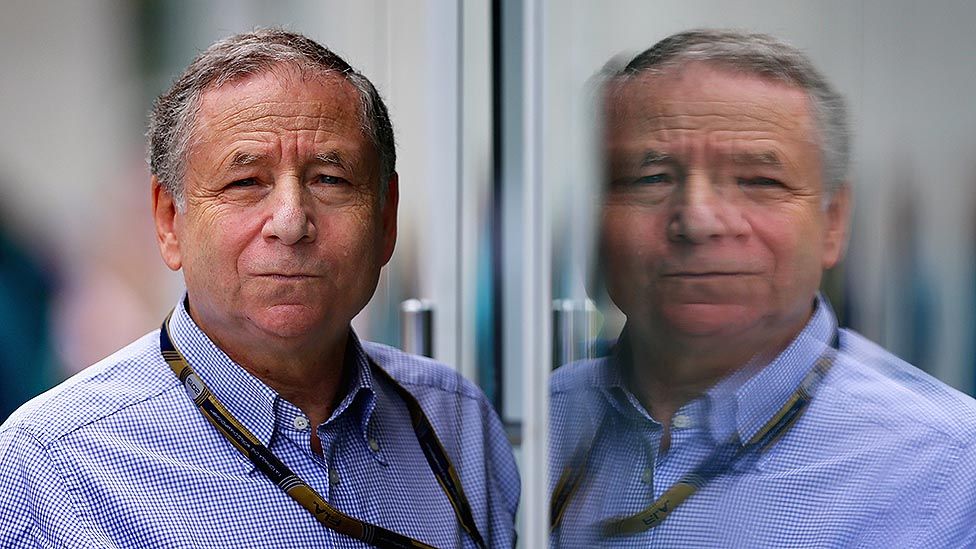FIA boss: Electric F1 racing is 'simply not possible'
- Published

The car industry may be going green and heading for an all-electric future, but the same cannot be said of Formula One motor racing - at least, not for decades.
That's according to the outgoing president of the sport's governing body, the International Automobile Federation (FIA). "It's simply not possible," explains Jean Todt, with a shake of the head and a wry smile.
"In Formula One, a race distance is about 200 miles (305km). Without recharging, with the performance of the cars, electricity will not allow that," he says.
"Maybe in 20 years, 30 years, I don't know. But at the moment it would be simply impossible."
The 75-year-old Frenchman is a key figure in global motorsport. A one-time co-driver (or navigator) in rallying, he later oversaw the Ferrari Formula One team with which Michael Schumacher won five of his seven world championships.
After a stint in charge of Ferrari itself, he was elected president of the FIA in 2009. Mr Todt has remained in the post ever since, but will step down later this month.
The FIA oversees motor racing series or competitions around the world. But it is also heavily involved in promoting road safety and sustainability.
For Mr Todt, motorsport has a clear role to play as a laboratory for technologies which can ultimately benefit all road users.
He points to Formula E, a championship for electric racing cars initially conceived at a dinner in Paris 10 years ago, which he attended along with the Spanish businessman Alejandro Agag and EU commissioner Antonio Tajani. The idea was sketched out on one of the restaurant's napkins.
That championship is now gearing up for its eighth season. There have been setbacks - not least the recent withdrawal of teams from Audi and BMW, while Mercedes plans to leave at the end of next season.
But according to Mr Todt, its role in refining electric car technologies should not be underestimated.
"Eight years ago, to do a 45-minute race, drivers needed to change cars halfway through, because of range limitations. Now, we can do the same race distance with only one car.
"All of this experience, all this research, is profitable to road users. That's why, now you hear about electric cars with a range of 400-500 kilometres (250-310 miles) which was not the case 10 years ago," he says. "Charging times have also decreased significantly."
But motor racing is not just a research ground for new technologies. It is also a multi-billion-pound spectator sport, particularly in the case of Formula One, and the two do not always sit comfortably together.
Seven years ago, the FIA mandated new engines for Formula One.
The turbocharged hybrid units had to be far more efficient than their predecessors: they were allowed just 100kg of fuel to last the entire race versus 150kg the season before. The hybrid systems recovered energy which would otherwise have been wasted, to help power the cars.
On the face of it, the new recipe was a triumph for sustainability. But the new engines were much, much quieter than their predecessors, and many fans were aghast. They resented the loss of the sound and fury which had been part of Grand Prix racing for generations.
With electrification, the trend away from visceral noise is only likely to accelerate. But Mr Todt does not see this as a problem.
"The fanatics, they weren't happy because they said 'we don't hear the noise'," he explains. "But we don't hear that anymore. You get used to it."
"There is great interest in Formula E - where there is no noise (at all). So I think it's very important to teach the supporters, to teach the fans, why we change the regulations."
But F1 faces other existential questions. As Mr Todt explains, with its powerful cars and long races, it cannot realistically become all-electric like Formula E.
Yet as more and more consumers start using battery-powered cars every day, I ask him, how will it remain relevant? "With hybridisation, very much developed, and with zero emission fuel", he says.
"Formula One is not going to produce pollution - CO2. Which is what we need to achieve."
Sustainability is not the only target, however. The FIA insists it is also committed to greater diversity and inclusion in motorsport. Yet there are many barriers to entry - it is 29 years since a female driver last tried to qualify for an F1 race.
Under Jean Todt, some progress has been made. A Women in Motorsport commission was set up in 2010, led by the former rally driver Michele Mouton. Its role has been to encourage more women to get involved in motor racing and help good drivers to progress further.
The W Series, an all-female championship using Formula 3 cars, has been running since 2019. Its aim is to promote female talent. At the time of its launch, there were criticisms that it represented a retrograde step, because women racers were still being segregated.
But the prospect of a female driver competing for the F1 World championship still seems a long way off.
"Gender equality and diversity are essential," insists Mr Todt. "We have been addressing that at the FIA.
"The first step, which is absolutely important - to say we want to have more women in motorsport - has started.
"Now we need a certain amount of time before we get the results."
Others, though, will now have to take that agenda forward, as Mr Todt himself prepares to drive off into the motor racing sunset.
Related Topics
- Published7 December 2021
- Published7 December 2021
- Published5 December 2021
- Published4 December 2021
- Published12 November 2021
- Published18 August 2021